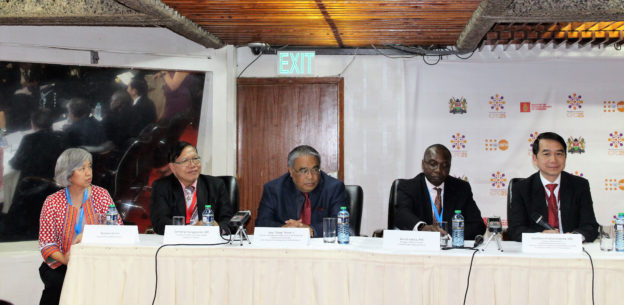Zero Fistula : Nigeria and the West African region is the theme of a concurrent session that took place on November 13, 2019 at the Nairobi summit on ICPD25.
The one hour and thirty minutes’ session that regrouped health experts, government officials, researchers, civil society organisations and media practitioners was aimed at placing obstetric fistula as a priority discussion point towards achieving the sustainable development goals(SDG) and the international conference on population and development(ICPD) programme of action.
It was also an opportunity to make a case for renewed investments in prevention, treatment and reintegration of fistula survivors.
The session convened by the center for population and reproductive health ; the international society of media in public health and fistula foundation Nigeria had the following key messages :
- The current scale of obstetric fistula response is not commensorate with the burden. We need to scale-up response. The times is Now.
- Countries and the international community must significantly step up efforts to ensure that every new case of fistula is prevented and every woman or girl suffering from fistula is treated and receives the follow-up, social reintegration and rehabilitation support she needs.
- Eliminating fistula is a key element of « leaving no-one behind » and the world risks failing to achieve the SDG targets if there is still a woman/girl left in the world who is suffering from fistula and is being neglected. Thus, it is critical to integrate fistula into the national-level planning for the SDGs including country-level targets and indicators in relation to Goals 1(Poverty) ; 3 (Health) ; 4 (Education) ; 5 (Gender Equality) ; 10(inequalities) ; and 17 (Partnerships).
- It is a grave injustice that around the world, in the 21st century, the poorest, most vulnerable and marginalized women and girls suffer needlessly from a devastating condition that is both preventable and largely treatable, and has been virtually wiped out of the industrialized world. Now is the time to end this severly neglected health and human rights tragedy.
- Promoting quality of care, preventing fistula- prevention is the « best medecine » when it comes to fistula, and each new case should and can be prevented when women get timely high-quality maternity care, including skilled birth attendance, midwifery care and emergency obstetric care, (as needed). UNFPA is addressing fistula prevention(as well as prevention of maternal and new born mortality and morbidity, and stillbirth), through its global midwifery programme, which is active in over 120 countries, as well as through its Emergency Obstetric and Newsborn Care programming.
- Every fistula-affected nation should develop an inclusive costed, time-bound national strategy and action plan to end fistula by 2030, as called for in the new UN Resolution on fistula, adopted by member states in December 2018. This is a critical component of an overall strategy to ensure 3 universal access to quality sexual and reproductive health and rights and as a key element of achieving the SDGs. Countries are also encouraged to form a national task force on fistula(led by the ministry of health/government) to bring together all key stakeholders to develop and impliment this critical strategy and action plan. The global community needs to significantly intensify support to nations with the greatest need.
- To end fistula, we must ensure universal access to quality sexual and reproductive health services ; eliminate gender-based social and economic inequities ; prevent child marriage and early childbearing ; promote education and broader human rights ; and foster community participation in finding solutions, including through the active involvement of men as well as seeking the help of fistula survivors as advocates. Ensuring access to fistula treatment (surgical repair) for all women and girls in need is also a key strategy for eliminating it.
The session ended with a note of hope to see things move forward as campaigns to eliminate obstetric fistula are intensified, community leaders are engaged in this battle and girls and women are more informed on the dangers they are exposed to.



